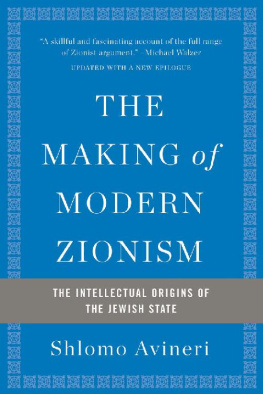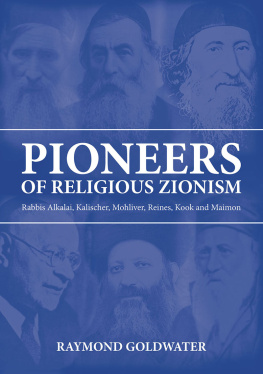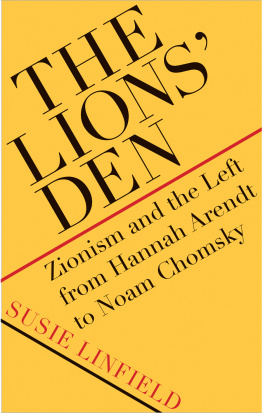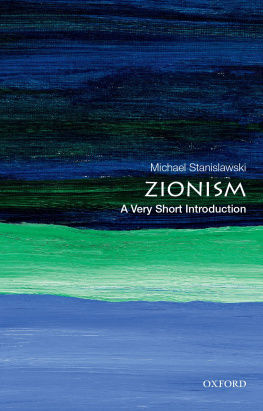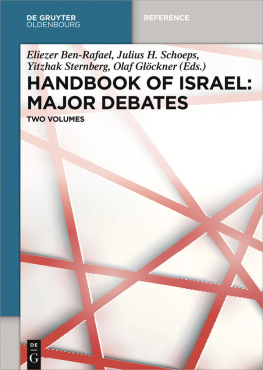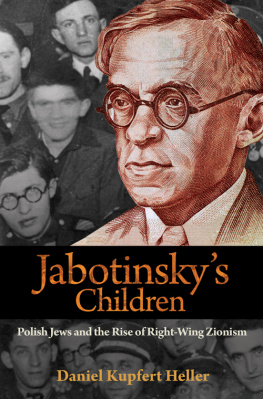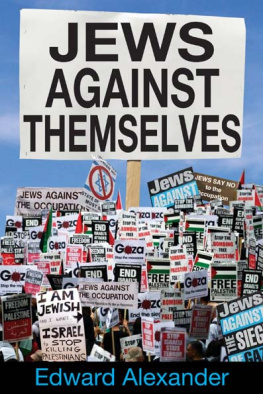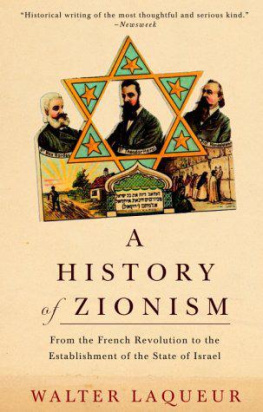
Also by Shlomo Avineri
Herzls Vision: Theodore Herzl and the Foundation of the Jewish State
Moses Hess: The Holy History of Mankind & Other Writings
Europes Century of Discontent (with Zeev Sternhell)
The Law of Religious Identity (with Andrs Saj)
Communitarianism and Individualism (with Avner de-Shalit)
Arlosoroff: A Political Biography
Moses Hess: Prophet of Communism and Zionism
Varieties of Marxism
Marxs Socialism
Hegels Theory of the Modern State
Israel and the Palestinians
Karl Marx on Colonialism and Modernization
The Social and Political Thought of Karl Marx

First edition copyright 1981 by Shlomo Avineri
Preface and Epilogue to the 2017 Edition 2017 by Shlomo Avineri
Published by Basic Books, an imprint of Perseus Books, LLC, a subsidiary of Hachette Book Group, Inc.
All rights reserved. Printed in the United States of America. No part of this book may be reproduced in any manner whatsoever without written permission except in the case of brief quotations embodied in critical articles and reviews.
For information, address Basic Books, 250 W. 57th St, 15th floor, New York, NY 10107.
Books published by Basic Books are available at special discounts for bulk purchases in the United States by corporations, institutions, and other organizations. For more information, please contact the Special Markets Department at Perseus Books, 2300 Chestnut Street, Suite 200, Philadelphia, PA 19103, or call (800) 810-4145, ext. 5000, or e-mail .
Library of Congress Control Number: 2017930727
ISBN: 978-0-465-09480-6 (2017 revised e-book)
10 9 8 7 6 5 4 3 2 1
CONTENTS
Great revolutions which strike the eye at a glance must have been preceded by a quiet and secret revolution in the spirit of the age (Zeitgeist), a revolution not visible to every eye, especially imperceptible to contemporaries, and as hard to discern as to describe in words. It is lack of acquaintance with this spiritual revolution which makes the resulting changes astonishing.
HEGEL
S INCE THE ORIGINAL PUBLICATION OF THIS BOOK IN 1981, a number of developments in Israel and the region have occurred which underline some of the successes and dilemmas of Zionism.
The disintegration of communism brought to Israel almost one million immigrants from the former Soviet Union. Civil war and internal disturbances in Ethiopia brought to the Jewish state around one hundred thousand members of its black Jewish community. Both immigrations, though as diametrically different in social, economic, and intellectual background as could be imagined, posed novel challenges to Israel, not all of which have been successfully overcome.
At the same time, both waves of immigration proved once again how crucial the very existence of a Jewish nation-state is to the fate of Jewish communities the world over. The fact that there is a country which will welcome Jewish immigrants if they feel persecuted or uncomfortable in their country of residence vindicates the moral foundation and raison detre of Zionism and of Israels Law of Return, which enables every Jewish person to immigrate to the country. Never again will Jewish persons persecuted or expelled find out that there is no place for them under the sun.
On another level, the 1993 Oslo Accords between Israel and the Palestinian Liberation Organization have opened the way for an eventual historical compromise between the two national movements: Zionism and Palestinian nationalism. Yet the hopes implied in what was undoubtedly a historical breakthrough have not been fulfilled.
Both sets of developments will be discussed at length in the new Epilogue added to this new edition.
As stated in my original Preface, this volume is not a history of Zionism. Its aim is more limited: to delineate a number of aspects of Zionist thought, as expressed through the writings of selected nineteenth- and twentieth-century individuals. This approach is intended to bring out both the enormous richness and variety of the intellectual ferment that gave rise to the call for a Jewish state as well as to show how the Zionist movement drew on both the legacy of Jewish tradition and the challenges of the modern age. It was this coalescence of the Sturm und Drang of the forces unleashed by the European Enlightenment with a historical Jewish heritage going back thousands of years, which endowed Zionism with its extraordinary appeal and force. For this reason I included pre-Zionist thinkers like Nachman Krochmal and Heinrich Graetz, whose contribution to the transformation of Jewish identity from merely religious into a modern, mainly secular national discourse seems to me of historical importance.
Every selection can be challenged, and the critical reader may question my inclusion of Vladimir Jabotinsky while not mentioning Chaim Weizmann, or including David Ben Gurion while leaving out Berl Katznelson. My criteria for inclusion related both to the question whether the person could be seen as expressing a distinct and somewhat systematic set of ideas as well as what his impact has been. It is for the second reason that thinkers like Jacob Klatzkin or Martin Buber have not been included. I am well aware that another author might have decided otherwise.
Because Zionism rose as a secular, political movement under concrete conditions in nineteenth- and twentieth-century Europe but also drew on deep historical sources, some of them religious, it is in a way much more complex and pluralistic, and perhaps even baffling, than other modern national movements. Without confronting this complexity it is difficult to understand both its impact and the challenges faced by it, and it is this multifaceted texture that my study aims to elucidate.
As I did in the Preface to the first edition, I would like to thank my wife Dvora and my daughter Maayan Avineri-Rebhun who helped me in more ways than can be conveyed in words to prepare this volume.
The Hebrew University
Mount Scopus, Jerusalem
A T THE ROOT OF ZIONISM LIES A PARADOX.
On the one hand, there is no doubt about the depth and intensity of the bond between the Jewish people and the Land of Israel: there had always been a Jewish community, albeit a small one, living in Palestine, and there had always been a trickle of Jews coming to live and die in the Holy Land. Moreover, during eighteen centuries of exile, the link to the Land of Israel always loomed large in the value system of Jewish communities all over the world and in their self-consciousness as a group. Had this tie been severed and had the Jews not regarded the Land of Israel as the land of both their past and their future, then Judaism would have become a mere religious community and would have lost its ethnic and national elements. What singled out the Jews from the Christian and Muslim majority communities in whose midst they have resided for two millennia was not only their distinct religious beliefs but also their linktenuous and nebulous as it might have beenwith the distant land of their forefathers. It was because of this that Jews were considered by othersand considered themselvesnot only a minority but a minority in exile.
On the other hand, the fact remains that for all of its emotional, cultural, and religious intensity, this link with Palestine did not change the praxis of Jewish life in the Diaspora: Jews might pray three times a day for the deliverance that would transform the world and transport them to Jerusalem, but they did not emigrate there; they could annually mourn the destruction of the Temple on
Next page
